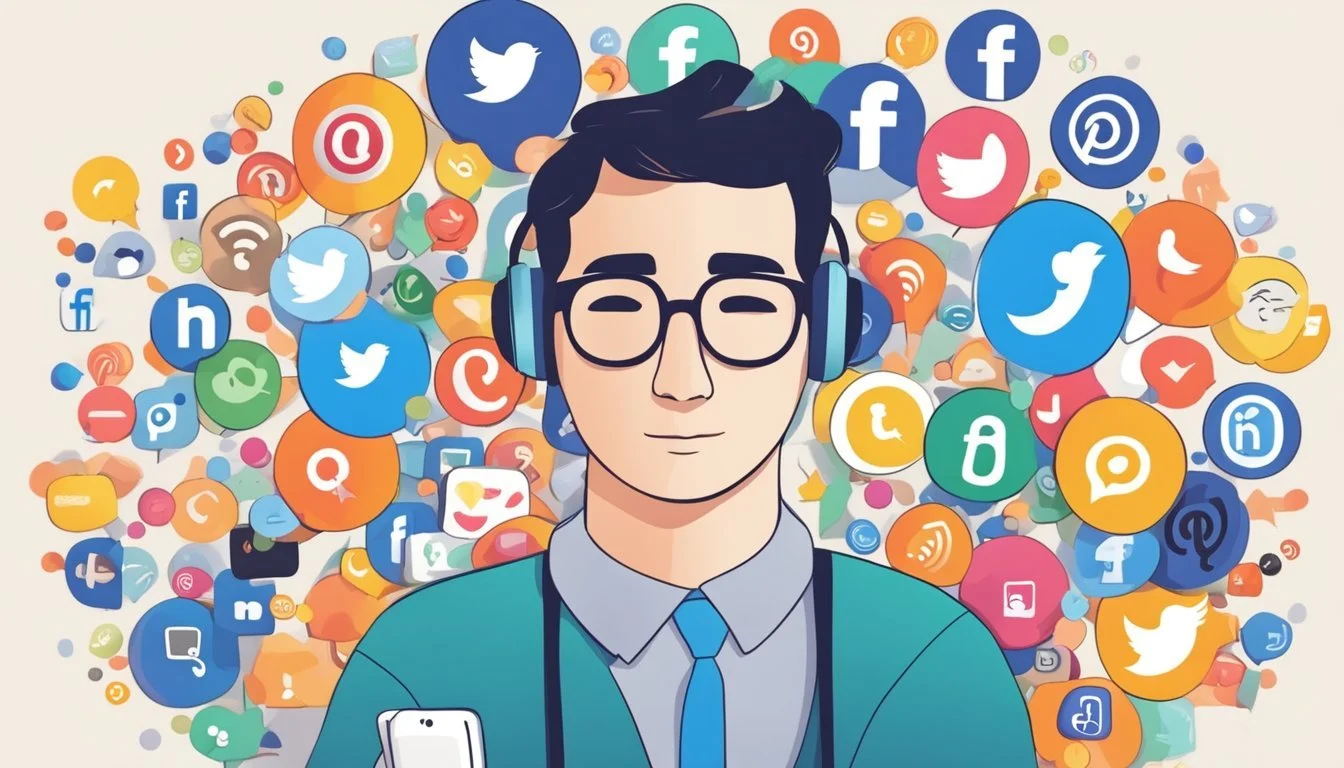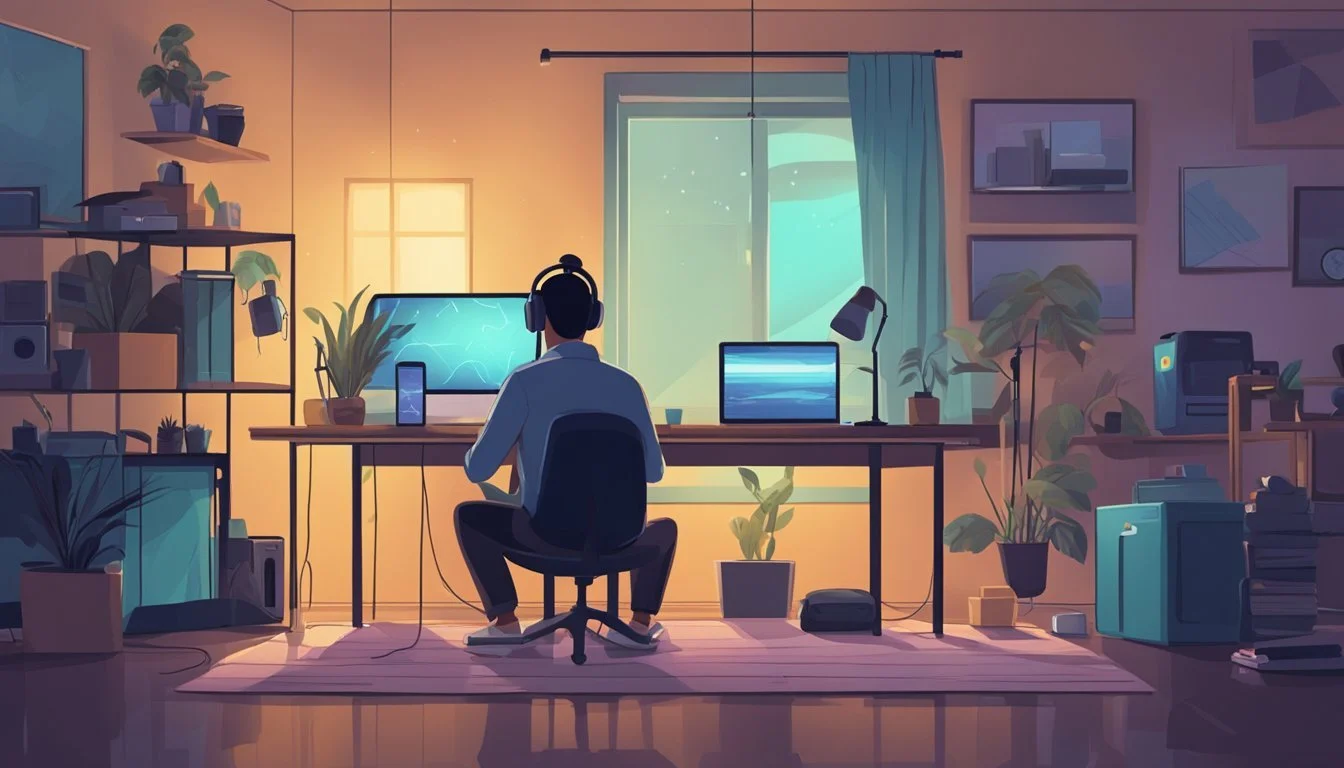Is Social Media Bad for Mental Health or Can It Be Beneficial Too?
Social media has become an integral part of modern life, especially for younger generations. As its influence grows, researchers are increasingly examining its effects on mental health. Recent studies have shed light on the complex relationship between social media use and psychological well-being.
Evidence suggests that excessive social media use is linked to reduced well-being and mood disorders such as depression and anxiety, particularly among teenagers. Internal research by major platforms has revealed concerning trends, including worsened body image issues and increased feelings of anxiety among young users.
Despite these negative associations, social media can also offer benefits such as connection and community support. The key lies in understanding its potential impacts and learning to use it in a balanced, healthy manner. Parents and individuals alike can take steps to mitigate risks and promote positive online experiences.
Understanding Social Media
Social media has transformed communication and connectivity in the modern world. Its rapid evolution and widespread adoption have reshaped how people interact, share information, and form communities online.
Evolution and Role in the Digital Age
Social media emerged in the late 1990s with platforms like Six Degrees and Friendster. The launch of Facebook in 2004 marked a turning point, leading to explosive growth in social networking sites. Today, social media plays a central role in daily life for billions of users worldwide.
These platforms have revolutionized how people stay connected, access news, and express themselves. They've created new avenues for businesses to reach customers and for individuals to build personal brands. Social media has also become a powerful tool for social movements and political engagement.
The digital age has seen social media integrate deeply into society, influencing everything from personal relationships to global events. Its impact extends to education, commerce, and entertainment, blurring the lines between online and offline experiences.
Types of Social Networking Platforms
Social media encompasses a diverse range of platforms, each with unique features and target audiences. Popular categories include:
Social networks (Facebook, LinkedIn)
Microblogging sites (Twitter, Tumblr)
Photo-sharing apps (Instagram, Pinterest)
Video platforms (YouTube, TikTok)
Professional networks (LinkedIn)
Discussion forums (Reddit)
Each platform offers distinct ways for users to create and share content, interact with others, and build communities around shared interests. Some focus on specific media types, while others provide more versatile tools for communication and networking.
Patterns of Social Media Use among Different Demographics
Social media usage varies significantly across age groups, cultures, and socioeconomic backgrounds. Young adults and teenagers are typically the most active users, with platforms like Instagram and TikTok particularly popular among Gen Z.
Older adults have increased their social media presence in recent years, often favoring Facebook and LinkedIn. Gender differences in platform preferences and usage patterns also exist. Women tend to be more active on visual platforms like Pinterest and Instagram.
Usage motivations differ by demographic as well. Teens often use social media for self-expression and peer connection. Young adults may focus on professional networking and staying informed. Older users frequently cite family connections as a primary reason for social media use.
Cultural factors influence platform choices and usage patterns globally. Some countries have their own dominant social networks, reflecting local preferences and regulations.
Psychological Implications of Social Media Use
Social media use can profoundly impact psychological wellbeing, mood, and self-perception. These effects manifest in complex ways across different aspects of mental health.
The Concept of Wellbeing in the Online Realm
Social media shapes users' sense of wellbeing in both positive and negative ways. Platforms can foster connection and community, allowing people to maintain relationships across distances. This social support can boost mood and life satisfaction.
However, excessive use often correlates with decreased wellbeing. Constant comparison to curated online personas can lead to feelings of inadequacy. The fear of missing out (FOMO) can also cause anxiety and stress.
Time spent online may replace in-person interactions, potentially increasing loneliness. Cyberbullying and online harassment pose serious threats to mental health, especially for vulnerable users like teenagers.
Social Media and Mood Disorders
Research shows links between heavy social media use and increased risk of mood disorders. Excessive screen time correlates with higher rates of depression and anxiety, particularly among young people.
Social media's addictive nature can disrupt sleep patterns, further impacting mood. The constant stream of information can overwhelm users, leading to stress and irritability.
However, social platforms can also provide valuable support for those with mood disorders. Online communities offer spaces to share experiences and coping strategies. Some users find that expressing themselves online helps alleviate symptoms.
Impact on Self-Esteem and Body Image
Social media significantly influences self-perception and body image. Exposure to idealized images can lead to negative self-comparisons and lower self-esteem.
Photo editing tools and filters create unrealistic beauty standards. This can contribute to body dysmorphia and eating disorders, especially among young women.
Likes, comments, and follower counts become metrics for self-worth. This external validation can create an unhealthy cycle of seeking approval online.
Some users leverage social media for body positivity and self-acceptance. Diverse representation can help counter mainstream beauty ideals. However, the overall impact on self-esteem tends to be more negative than positive.
Social Media's Contributions to Mental Health Concerns
Social media usage has been linked to several mental health issues. These include depression, anxiety, and cyberbullying, which can significantly impact users' well-being.
Correlation between Social Media Usage and Depression
Studies have shown a connection between heavy social media use and increased risk of depression. Excessive time spent on platforms like Instagram or Facebook can lead to negative comparisons and feelings of inadequacy.
Social media often presents idealized versions of people's lives, causing users to feel their own lives are lacking. This constant exposure to carefully curated content can trigger or exacerbate depressive symptoms.
Research indicates that individuals who reduce their social media usage often report improvements in mood and overall well-being. However, the relationship between social media and depression is complex, with factors like individual susceptibility and usage patterns playing important roles.
Anxiety and the Fear of Missing Out (FOMO)
Social media can fuel anxiety, particularly through the phenomenon known as FOMO. Users may feel compelled to constantly check their feeds to stay updated on social events, news, and trends.
This persistent need to be connected can lead to:
Increased stress levels
Disrupted sleep patterns
Difficulty concentrating on tasks
FOMO can create a cycle of anxiety, where the fear of missing out drives more frequent social media use, which in turn heightens anxiety. Breaking this cycle often requires conscious effort to limit social media engagement and focus on real-world interactions.
The Role of Cyberbullying and Online Harassment
Social media platforms have become breeding grounds for cyberbullying and online harassment. The anonymity and distance provided by these platforms can embolden individuals to engage in harmful behavior.
Victims of cyberbullying may experience:
Low self-esteem
Anxiety and depression
Social isolation
Academic or work performance issues
The persistent nature of online content means that instances of bullying can have long-lasting impacts. Many platforms have implemented reporting and blocking features, but cyberbullying remains a significant concern for users' mental health.
Educating users about online safety and fostering a culture of respect are crucial steps in combating this issue. Schools and organizations increasingly recognize the need to address cyberbullying as part of broader mental health initiatives.
Behavioral Effects of Social Media
Social media impacts users' behaviors in significant ways. It can lead to excessive use, act as a distraction, and influence sleep patterns.
Excessive Use and Its Consequences
Social media platforms are designed to be engaging, often leading to prolonged use. Many users find themselves scrolling for hours, losing track of time. This excessive use can interfere with daily responsibilities and real-world interactions.
Constant checking of notifications and updates can become a compulsive behavior. Some individuals experience anxiety or fear of missing out (FOMO) when not connected.
Excessive social media use may also contribute to decreased face-to-face social skills. Users might struggle with in-person conversations or feel uncomfortable in social situations without a digital buffer.
Social Media as a Distraction and Its Effects on Productivity
Social media frequently interrupts focus and concentration. Notifications and the urge to check updates can disrupt work, study, or other important tasks.
Multitasking between social media and other activities often leads to reduced performance. Studies show that even brief interruptions can significantly impact productivity and the quality of work.
The constant stream of information on social platforms can overwhelm users, making it difficult to prioritize tasks or manage time effectively.
Influence on Sleep Quality and Routines
Using social media before bed can negatively impact sleep quality. The blue light emitted by devices suppresses melatonin production, making it harder to fall asleep.
Late-night scrolling often delays bedtimes, reducing overall sleep duration. This can lead to daytime fatigue and decreased cognitive performance.
Social media use can disrupt healthy sleep routines. The habit of checking platforms first thing in the morning and last thing at night can create an unhealthy sleep-wake cycle.
The Social Aspect of Social Media
Social media platforms shape how we connect, express ourselves, and perceive others online. These digital spaces can foster community but also influence self-esteem and feelings of belonging in complex ways.
Building Community and Self-Expression
Social media provides opportunities for individuals to find like-minded people and form online communities. Users can join groups centered around shared interests, hobbies, or causes. This allows for connections that may not be possible in offline settings due to geographic or social limitations.
These platforms offer avenues for self-expression through posts, photos, and videos. Users can showcase their personalities, talents, and experiences to a wide audience. For many, this acts as a creative outlet and a way to document their lives.
Social media also enables rapid information sharing and mobilization around social issues. Movements can gain traction quickly, allowing for increased awareness and engagement on important topics.
Comparison and Low Self-Esteem
The curated nature of social media can lead to unrealistic comparisons. Users often present idealized versions of their lives, showing only highlights and successes. This can create a distorted view of reality for viewers.
Constant exposure to seemingly perfect lives, bodies, and achievements may negatively impact self-esteem. People may feel inadequate when comparing their own experiences to the polished images they see online.
The pressure to maintain an appealing online presence can be stressful. Users may feel compelled to present a certain image or lifestyle, even if it doesn't align with their authentic selves.
Loneliness versus a Sense of Belonging
Social media can both alleviate and exacerbate feelings of loneliness. For some, these platforms provide a sense of connection and belonging, especially when face-to-face interactions are limited.
However, excessive social media use may replace in-person social interactions. This can lead to increased feelings of isolation, despite being digitally connected to many people.
The quality of online relationships may differ from offline connections. While social media can facilitate new friendships, these bonds may lack the depth and intimacy of in-person relationships.
Strategies for Healthy Social Media Use
Social media can be used in ways that support mental wellbeing. Implementing boundaries, practicing mindfulness, and developing coping skills are key strategies for fostering a healthier relationship with digital platforms.
Setting Boundaries and Screen Time Limits
Create designated social media-free times and spaces. Set specific hours for checking platforms, such as 30 minutes in the morning and evening. Use built-in screen time tracking tools on devices to monitor usage.
Establish tech-free zones in the home, like bedrooms and dining areas. This promotes better sleep habits and in-person connections. Consider a "digital sunset" - turning off devices 1-2 hours before bed.
Use app blockers or time-limiting features to restrict access to social media during work or study hours. This improves focus and productivity. Periodically delete social apps from devices for short "detox" periods.
Mindfulness and Self-Awareness Online
Practice mindful scrolling by setting an intention before using social media. Ask: "Why am I logging on? What do I hope to gain?" This promotes purposeful engagement.
Be aware of emotional responses to content. Notice if certain posts or accounts trigger negative feelings. Unfollow or mute sources that consistently impact mood negatively.
Take regular breaks during social media use. Set a timer for 10-15 minute intervals. Use these pauses to check in with your body and emotions. Stand up, stretch, or take a few deep breaths.
Coping Mechanisms and Seeking Professional Resources
Develop healthy coping strategies for managing social media-induced stress or anxiety. Try deep breathing exercises, journaling, or physical activity when feeling overwhelmed.
Engage in offline activities that boost self-esteem and wellbeing. Pursue hobbies, exercise, or spend time in nature as alternatives to social media use.
Seek support from trusted friends or family members about social media concerns. Consider talking to a mental health professional if social media significantly impacts mood or daily functioning.
Utilize online resources like mental health apps or support groups moderated by professionals. These can provide additional coping tools and community connection.
Research Perspectives and Studies
Multiple research approaches have examined the complex relationship between social media use and mental health outcomes. Studies range from systematic reviews to focused analyses of gender differences and depression.
Systematic Reviews and Cross-Sectional Studies
Systematic reviews have provided valuable insights into social media's impact on mental wellbeing. These comprehensive analyses synthesize findings from numerous studies to identify overarching trends. Cross-sectional studies offer snapshots of social media use and mental health at specific points in time.
Research has shown mixed results. Some studies link increased social media use to higher rates of anxiety and depression. Others highlight potential benefits like enhanced social connections and access to support networks.
Methodological challenges persist in this field. The rapid evolution of social media platforms makes it difficult to conduct long-term studies. Self-reported data may also introduce biases.
Analyzing Gender Differences in Social Media Impact
Studies have explored how social media affects men and women differently. Research indicates that women may be more susceptible to negative mental health impacts from social media use.
Factors contributing to gender differences include:
Higher rates of social comparison among women
Greater exposure to idealized body images
Increased likelihood of cyberbullying victimization
Men, however, are not immune to negative effects. Some studies suggest they may experience feelings of inadequacy related to career or lifestyle comparisons on social platforms.
Research in this area continues to evolve, with growing recognition of the need to consider non-binary gender identities in future studies.
Connection between Social Media and Major Depressive Episodes
Several studies have explored links between social media use and major depressive episodes. Key findings include:
Increased risk of depression symptoms with excessive social media use
Potential bidirectional relationship between depression and social media habits
Role of sleep disruption as a mediating factor
Social comparison on platforms like Instagram has been associated with depressive symptoms. The constant exposure to curated, idealized versions of others' lives can negatively impact self-esteem.
Some research suggests that reducing social media use may alleviate depressive symptoms in vulnerable individuals. However, more longitudinal studies are needed to establish causal relationships.
Conclusions and Future Directions
Social media's impact on mental health remains complex and nuanced. Research indicates both positive and negative effects, highlighting the need for balanced usage.
Platforms can foster connection and support, especially for marginalized groups. They also provide outlets for self-expression and creativity.
Conversely, excessive use correlates with increased anxiety, depression, and loneliness. Comparison with others' curated lives can damage self-esteem and body image.
Future studies should explore the long-term consequences of social media on developing brains. Particular focus is needed on adolescents and young adults.
Researchers must investigate effective coping strategies for managing digital stress. This includes developing healthy habits around social media consumption.
The role of social media in mental health treatment and support groups warrants further examination. Online communities may offer valuable resources for those with limited access to care.
Cross-cultural studies are essential to understand how social media impacts mental health globally. Different cultural contexts may yield varied outcomes.
As technology evolves, ongoing research is crucial to address emerging platforms and features. This will help inform policies and guidelines for responsible use.
Ultimately, promoting digital literacy and mindful engagement with social media is key to maximizing benefits while minimizing risks to mental wellbeing.



